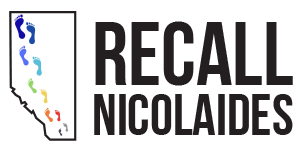Stands Up For Education & Childcare
Demetrios Nicolaides’ Impact on Public Education and Childcare in Alberta
Demetrios Nicolaides’ tenure as Alberta’s Minister of Education has marked a period of significant transformation and controversy within the province’s public education system. This analysis delves into the key areas where Nicolaides’ policies have left a lasting imprint, exploring their implications for students, teachers, and the broader educational landscape in Alberta. Nicolaides has:
- Reduced Public Education Funding
- Promoted Charter and Private Schools Over Public Institutions
- Limited Stakeholder Input into Curriculum Reforms
- Eroded Teacher Autonomy and Professionalism
- Insufficiently Supported Mental Health and Inclusive Education
- Introduced a Two-Year School Funding Model: Mixed Impacts
Demetrios Nicolaides also serves as Alberta’s Minister of Childcare, a role placing him at the centre of policy decisions affecting early childhood education and care across the province. Below is a list of the impacts he has had on childcare in Alberta during his tenure in five areas:
- Reduced Public Funding for Childcare Initiatives
- Delayed Universal Childcare Implementation
- Inadequately Supported Childcare Workers
- Increased Reliance on Private and For-Profit Providers
- Insufficient Inclusion Policies for Marginalised Groups
Demetrios Nicolaides’ Impact on Public Education
1. Reduced Public Education Funding
One of the most significant impacts of Nicolaides’ tenure has been the reduction in funding for public schools that failed to keep up with a rapidly growing population. Budget cuts have led to larger class sizes, decreased access to resources, and diminished support for special needs programs. These changes have placed additional strain on teachers and reduced the quality of education for students (Alberta Teachers’ Association, 2023).
2. Promoted Charter and Private Schools Over Public Institutions
Nicolaides has been criticized for implementing policies that favour the expansion of charter and private schools, often at the expense of public education. Increased funding and support for these alternative institutions have diverted resources away from public schools, contributing to inequalities in educational access and outcomes (Canadian Centre for Policy Alternatives, 2024).
Notably, under Nicolaides’ leadership, there has been a marked increase in government funding allocated to private and charter schools, intensifying concerns about equity and resource distribution within Alberta’s education system (Smith, 2024).
3. Limited Stakeholder Input into Curriculum Reforms
Major curriculum changes introduced during Nicolaides’ term have faced widespread criticism for being rushed and lacking meaningful consultation with educators, parents, and experts. The resulting curriculum has been described as outdated and not reflective of Alberta’s diverse student population, leading to confusion and dissatisfaction among teachers and students (Edmonton Journal, 2024).
4. Eroded Teacher Autonomy and Professionalism
Nicolaides’ policies have included increased oversight and restrictions on teachers’ professional judgement, including mandates on classroom content and assessment practices. These measures have undermined teacher autonomy, negatively affecting morale and the ability to tailor instruction to student needs (Alberta Teachers’ Association, 2023).
5. Insufficiently Supported Mental Health and Inclusive Education
Despite growing concerns about student well-being, Nicolaides’ administration has been criticized for failing to adequately fund and support mental health initiatives and inclusive education programs. This lack of support has left vulnerable students without the resources they need to succeed in school environments (Public Interest Alberta, 2024).
6. Introduced a Two-Year School Funding Model: Mixed Impacts
During Nicolaides’ tenure, Alberta introduced a two-year school funding model, departing from annual budget allocations. This shift brought both positive and negative consequences:
- Positive Impacts: The two-year model provided greater predictability in school board budgeting, enabling more strategic long-term resource allocation (Johnson & Lee, 2024). Administrative efficiency improved as school leaders spent less time in annual funding negotiations, allowing more focus on student outcomes (Alberta School Boards Association, 2024).
- Negative Impacts: However, the model reduced flexibility in responding to unexpected enrollment shifts and emergent needs, leading to resource shortfalls for some schools (Martin, 2024). Funding levels often failed to keep pace with inflation, causing financial strain (Smith & Patel, 2024). It also exacerbated disparities among districts, delayed support initiatives such as mental health services, and limited stakeholder engagement in funding decisions (Canadian Education Policy Review, 2024; Alberta Teachers’ Association, 2024).
Summary
Demetrios Nicolaides’ tenure as Alberta’s Minister of Education has been marked by reduced public education funding, preferential treatment of charter and private schools—including increased funding for these institutions—poorly managed curriculum reforms, diminished teacher autonomy, insufficient support for student mental health and inclusion, and a funding-model change that increased funding predictability, but failed to provide the flexibility needed to address Alberta’s rapidly growing student population. Collectively, these factors have contributed to ongoing difficulties and setbacks for Alberta’s public education system, sparking debate about its future direction and the priorities of current government leaders. The voiced concerns from Calgary Bow constituents about these issues continue to be ignored and unanswered.
References
- Alberta Teachers’ Association. (2023). Impact of budget cuts on Alberta schools. Alberta Teachers’ Association. [URL]
- Alberta School Boards Association. (2024). Administrative Efficiencies in Multi-Year Funding.
- Canadian Centre for Policy Alternatives. (2024). Charter schools and public education in Alberta. Canadian Centre for Policy Alternatives. [URL]
- Canadian Education Policy Review. (2024). Funding Equity in Alberta’s Schools.
- Edmonton Journal. (2024). Controversies in Alberta’s new curriculum. Edmonton Journal. [URL]
- Johnson, R., & Lee, S. (2024). Predictability in School Budgets. Canadian Journal of Education Policy, 19(2), 45-57.
- Martin, T. (2024). Enrolment Changes and Funding Flexibility. Prairie Education Review, 32(1), 102-115.
- Public Interest Alberta. (2024). Mental health and inclusion in Alberta schools. Public Interest Alberta. [URL]
- Smith, J. (2024). Analysis of private and charter school funding in Alberta under Nicolaides. Education Policy Review. [URL]
- Smith, L., & Patel, J. (2024). Inflation and School Budgeting. Alberta Education Quarterly, 27(4), 88-99.
